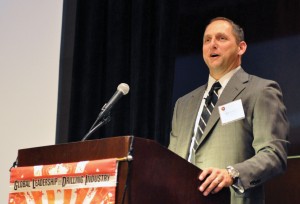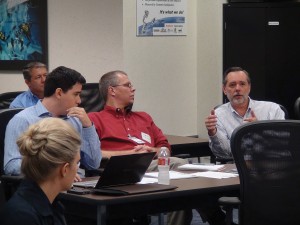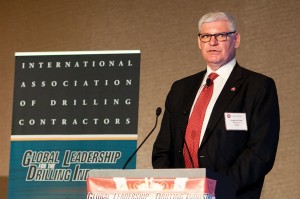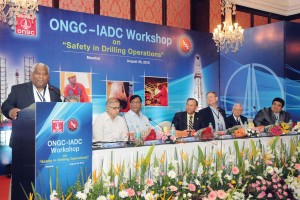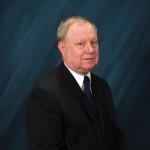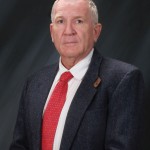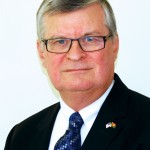Annual General Meeting Special: IADC 2012 – A year of reflection, changes
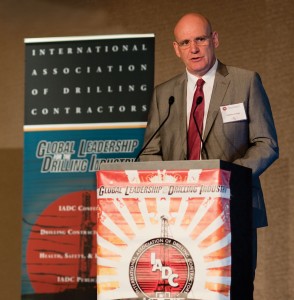
The drilling world is rapidly changing, and IADC is changing with it. With our strategic review recently completed, we’ve begun reshaping ourselves and have started to roll out new global initiatives aligned with our new way forward. Our agenda is ambitious, but we are totally committed to delivering it on behalf of our members.
IADC provides global leadership for the drilling industry to achieve our core purpose of catalyzing improved performance by enhancing operational integrity and shaping better regulation. Towards this, IADC efforts and activities will be directly focused on members’ critical issues while remaining mindful of stakeholder needs and attitudes. In everything we do, IADC staff will strive to continuously raise IADC’s organizational effectiveness, which will ensure we are delivering maximum value to our members.
On the operational integrity side, IADC has commissioned a detailed study of the existing committee structure to strengthen this critical delivery mechanism for our members. The new structure will ensure more efficient member alignment on issues critical to drilling and completion operations and drive faster delivery of value-adding products.
To foster more active participation with IADC committees and workgroups, regardless of member location around the world, we recently opened the Crown Center of Excellence at IADC’s Houston office. The multipurpose conference and meeting facility can also be used for bespoke training courses to produce the enhanced competence that workers in this industry so urgently need.
Another major step-change launched this year is IADC’s Knowledge, Skills and Abilities (KSA) project, which is developing worldwide competency guidelines for virtually all rig positions, with a priority on safety-critical positions with well control responsibilities.
“The revamped KSAs will provide the industry with a benchmark for globally consistent drilling position requirements, as well as recommend means for effectively evaluating personnel,” said IADC president/CEO Stephen Colville. The first of the competency guidelines will be issued early next year.
A comprehensive update to the IADC Drilling Manual is another critical project we’re taking on. This end-to-end revision aims not only to update existing chapters but also incorporate information on new technologies and industry best practices. The new edition is expected to be published in print and electronic formats, which will allow for continuous updating to keep the manual “evergreen” and abreast of evolving technologies.
To ensure IADC’s services are truly international, the association is looking to expand its global capacity with new offices in key markets and will provide increased support to regional chapters. For example, in Brazil’s large and expanding drilling market, IADC members urgently require representation and assistance on many critical issues.
When it comes to shaping better regulations, IADC is also “stepping up and stepping out.” With both members and regulators increasingly desiring more globalized regulatory regimes, IADC recognizes the need to raise its profile as a proactive champion for drilling companies and drive advocacy on both chronic and critical issues.
For our land members, for example, IADC is actively liaising with the US Bureau of Land Management on its proposed hydraulic fracturing rule that could significantly threaten the land business.
These are just a few of the changes that are brewing at IADC, and many more new and exciting initiatives will be rolled out next year. We invite you to become an active participant in their successful development and delivery.
Brian Petty, executive vice president – government affairs
 IADC represents industry in arctic council meeting
IADC represents industry in arctic council meeting
Mr Petty represented the drilling industry on the US delegation to meetings of the Arctic Council Task Force for Arctic Marine Oil Pollution Preparedness and Response, held in October and December 2011 in Oslo, Norway, and St. Petersburg, Russia, respectively.
The task force was commissioned to promote awareness of and cooperation in sharing information, response equipment and personnel across the Arctic in response to a major spill event. IADC’s attendance as a private-sector participant was requested by the US Coast Guard to provide industry perspectives on suitability of equipment, equipment stockpiles and logistical considerations in identifying, mobilizing, deploying and demobilizing equipment.
In her invitation to IADC, Coast Guard Rear Admiral Cari Thomas, who headed the US delegation, noted that IADC’s insights and knowledge specific to the drilling industry would enhance discussions at the meeting.
Shell, representing IPIECA, was the only other industry participant invited.
Besides the Coast Guard, the other federal agencies represented in the delegation were the US Bureau of Safety and Environmental Enforcement (BSEE) and the National Oceanic and Atmospheric Administration. Government representatives from all Nordic countries, as well as Canada, the United States and Russia, also made presentations.
The task force is co-chaired by ambassadors Karsten Klepsvik of Norway, Anton Vasiliev of Russia and David Balton of the US.
A first draft of an agreement among the eight Arctic states, prepared by Norway, was reviewed at the December meeting. It was the consensus that the instrument will be binding. The group also agreed that only oil spills will be included. All sources of spills are included: shipping, oil and gas E&P, cargo ships, terminals, tourism ships, pipelines, etc. Military ships and installation oil spills are excluded.
Each article within the instrument was reviewed, and states were given opportunities to discuss what should be included or excluded. The goal is to deliver the final instrument for signature at the May 2013 meeting of the Arctic Council Ministers.
UK’s highest court upholds WTD ruling
The culmination of eight years of litigation in UK courts, the UK Supreme Court upheld the previous rulings of the Court of Session and Employment Appeal Tribunal that time off work enjoyed by UK offshore oil and gas workers more than meets the minimum legal amount of annual leave that employers must provide their employees.
Typical rotas worked offshore allow for more than 26 weeks onshore, away from work, more than meeting the requirement of the Working Time Directive (WTD) to provide 5.6 weeks of annual leave.
This Supreme Court decision is final and can’t be appealed to the European Court of Justice.
Industry comments on draft PEIS for OCS program
Providing comments to be considered before the Draft Programmatic Environmental Impact Statement (DPEIS) is finalized for the proposed 2012-2017 Outer Continental Shelf (OCS) leasing program, seven industry groups, including IADC, reiterated disappointment in the limited scope of the DPEIS. However, the groups also expressed support for the work of the US Bureau of Ocean Energy Management (BOEM) in preparing for the DPEIS.
Comments were submitted in early 2012 to James Bennett, BOEM Division of Environmental Assessment chief. They pointed to the missed opportunity to increase access to additional OCS energy resources in the Eastern Gulf of Mexico, offshore Alaska and on the US East Coast, especially offshore Virginia. “The result is greater dependence on foreign sources of oil and gas,” the groups stated.
However, with as many as 15 lease sales among the six OCS planning areas in the proposed action plan, industry believes the DPEIS includes an acceptable range of offshore access.
The groups further identified numerous areas where further attention to the statements made is needed, as well as areas where there is incomplete or unavailable information.
Regulators were urged to use existing legal authorities and mechanisms as the foundation for future actions to carry out coastal and marine spatial planning. In addition, the coexistence of native subsistence hunting and fishing and modern commercial development in Alaska demands more thought in the context of future lease sales.
86 groups object to trade agency reorganization
Eighty-six groups representing the business and agricultural communities, including IADC, jointly wrote to US President Barack Obama expressing concerns over a proposal to merge the Office of the US Trade Representative (USTR) with five other agencies into a single cabinet-level department.
The USTR plays an invaluable role in coordinating the different entities within the US government with specialized trade functions based on expertise. By balancing the interests of various constituencies and agencies, the USTR provides assurance “that no one has a thumb on the scale,” the letter stated.
As a separate entity within the Office of the President, the USTR is able to act responsively to negotiate, implement and enforce US trade objectives. The USTR is actively involved in growing US exports, eliminating foreign market barriers and improving the overall competitiveness of US farm and manufactured goods and services in the global economy.
Mr Petty, in his capacity as ITAC2 chairman, counsels the US Trade Representative and the US Secretary of Commerce on international trade issues. Mr Petty also was designated by the US Secretary of Commerce and USTR as chairman of the Investment Working Group of the Department of Commerce Industry Trade Advisory Committees (ITACs).
OGP responds to proposal for EU offshore safety initiative
Responding to the proposal for an EU safety initiative for the offshore oil and gas industry, the International Association of Oil & Gas Producers (OGP) has asked the European Commission to look to legislation in the form of a directive that would allow member states to adjust to local circumstances and align with existing regulatory frameworks.
IADC has been actively involved with development of OGP’s position paper, which was delivered to the commission’s Directorate-General for Energy in January.
The paper notes that the offshore E&P industry has developed recommendations for improving well incident prevention, intervention and response capability over the past couple of years. This work has already achieved better engineering design and well operations management, improved capping devices, and enhanced oil spill preparedness and capability.
The paper also details OGP’s concerns with several key issues.
• Europe’s offshore oil and gas activities would come to a halt unless there are adequate transition periods to ensure consistency between national legislation and the proposed regulation. A transition time line should follow a risk-based approach to allow prioritizing higher-risk activities, and revision of environmental and safety documentation should not follow a one-size-fits-all approach.
• Numerous definitions require clarifications before industry could operate under the proposed regulation, and these definitions must be consistent with the body of definitions currently used in member states. Changes to definitions, including “operators” and “major accident,” are proposed.
• A mandatory separation of licensing procedures would be against common and proven practice and would jeopardize industry’s contribution to employment and economic growth in Europe. Important economic incentive structures in place could be damaged. Further, OGP does not recognize that the proposed changes would add to an existing safety regime.
• Amending the Environmental Liability would unnecessarily increase the legal uncertainty while the commission is conducting a review of risk and liability.
• Mandating independent verification by a third party would not necessarily lead to an increase in safety standards. Second-party verification is acceptable and effective in many circumstances.
• The industry is in favor of continuous improvement and believes the ordinary legislative procedure, which allows for engagement of all stakeholders, is more effective than delegated powers.
• MODU 2009 is effective for rigs constructed after 1 January 2012. However, existing rigs would not be in compliance and would be excluded from use in the EU. The proposal should allow for the use of rigs in accordance with earlier revision versions of the code, as long as all remaining requirements of this regulation are met.
Amicus brief supports Beaufort exploration plan
Industry groups jointly filed an amicus brief in defense of the US government’s approval of Shell’s Beaufort Sea exploration plan. IADC was joined by the API, US Chamber of Commerce, National Association of Manufacturers and the US Oil and Gas Association in filing the document with the US Ninth Circuit Court of Appeals in February.
The court previously rejected efforts to block Shell’s planned exploratory activities in the Beaufort and Chukchi seas in 2010, yet petitioners continue to seek to frustrate fundamental congressional objectives regarding the timing and character of the approval process for activities on the Outer Continental Shelf (OCS).
The amicus brief emphasized that the Interior Department’s approval of Shell’s 2012 revised exploration plan, following the preparation of an extensive environmental assessment, plainly complies with the requirements of reasoned decision making. This conclusion is supported by Congress’ adoption in the OCS Lands Act of a goal to encourage “expeditious” OCS exploration and production. Congress dictated that exploration plan approval decisions must be made within 30 days of plan submission and should be based on existing information. Approval should be forthcoming unless exploration would cause serious harm.
Further, thousands of OCS exploration plans have been approved under that time table and standard.
“Petitioners have failed to show an entitlement to have the approval decision set aside or vacated,” the brief stated.
Industry urges suspension of National Ocean Policy
IADC, NOIA and IPAA urged the National Ocean Council (NOC) to suspend implementation of the National Ocean Policy (NOP), pointing to major weaknesses in the draft implementation plan and a myriad of unanswered questions.
In a letter sent to NOC, industry groups said their chief concern lies with the anticipated use of coastal and marine spatial planning (CMSP), which could pose additional obstacles to access for oil and natural gas resources on the Outer Continental Shelf (OCS). Its use could mean that the requirements of “expeditious development” directed by the OCS Lands Act will be limited, leading to potentially serious conflicts. The NOC has not provided any more detail or recognition of how the NOP will avoid such conflict, the letter said.
Further, the CMSP may result in decisions being made about setting significant areas of the OCS off limits to future access without the benefit of knowing what resources lie underneath those areas. “It would be very shortsighted to make CMSP decisions without the benefit of new data,” the groups stated. At a minimum, new geological and geophysical data should be obtained.
The groups also pointed out that a national ocean policy is incomplete without greater recognition for how increased access to the OCS might help realize national policy objectives of job creation, greater energy security and reliability, and greater federal revenues derived from increased oil and gas activities. As such, suspension of policy implementation is needed until studies analyzing the potential economic, societal and legal impacts have been carried out and full engagement with Congress has taken place.
If the administration decides to move forward with implementation, a pilot project in one region should be undertaken. This would ensure a greater likelihood of meaningful stakeholder involvement and fewer unintended consequences.
Governors coalition pushes for more E&P access
The Outer Continental Shelf (OCS) Governors Coalition urged the Obama Administration to expand access to new offshore areas for energy development and to update evaluations of OCS resources. In a letter to President Obama from the governors of Alabama, Alaska, Louisiana, Mississippi, South Carolina, Texas and Virginia, the coalition noted that expanded access and new reserve assessments were among its top priorities for 2012.
“We remain disappointed by the administration’s failure to include new leasing areas in the Proposed Draft Five-Year Plan for Oil and Gas Leasing for 2012-2017,” the letter stated.
Despite strong bipartisan support from Virginia, the administration did not reinstate a lease sale offshore Virginia. “We urge the administration to consider more thoroughly the wishes of the affected states when considering offshore leasing plans,” the governors said.
Concerns also were expressed with the National Ocean Council and the proposed coastal marine spatial planning, noting that better understanding is needed of the bureaucratic hurdles that will be erected through the process.
Policymakers also need updated evaluations of OCS resources, included assessments in areas not currently available for leasing, they said. Such information would allow the federal government and states to set more informed policies.
Also among the coalition’s priorities is accelerating the pace and level of permitting for offshore E&P. “While some progress has been made to decrease the average wait time for approvals, we would urge stronger, swifter action,” the letter said.
Business groups urge facilitation of US investments in Burma
IADC was among 13 organizations that submitted a letter to President Obama urging the Administration to open the door to Burma’s further involvement in the US business community. With the victory in Burma’s by-elections signaling an improved electoral process, US companies have the opportunity to create the jobs and economic base needed for Burma to jump-start its economy and meet the expectations of its people, the letter stated.
“US companies can and do provide capacity building, training and respect for the environment, as well as projects to engage with communities where they work to a substantially greater degree than most of our competitors from other nations. As we have so often seen, the presence of US businesses and foreign investment inevitably helps lead to an improved human rights environment,” according to the groups’ letter.
The Administration was urged to lay out a plan that eases restrictions on private investment across all sectors and includes the same rules for all businesses. “Most urgently, the lifting of financial services facilitation and transactions sanctions will be essential to the sustainable expansion of the Burmese economy and the successful operation of any US business effort,” the letter stated.
Irish agency urged to reconsider regulations
IADC is among several industry organizations that the Irish Offshore Operators’ Association (IOOA) has recommended to meet with Ireland’s National Parks and Wildlife Service (NPWS) with the purpose of discussing proposals to protect marine mammals from man-made sound sources. The IOOA believes that the proposed changes are likely to result in drilling operations and seismic surveys taking substantially longer while offering little, if any, additional protection to marine life.
In comments submitted to the NPWS, the IOOA noted that extension of the 2007 Guidance to include drilling operations requires more consideration. Typical drilling operations are not continuous and don’t generate a constant sound pressure level. Drilling operations are complex and require a range of different activities, and this must be recognized in the Draft Guidance, IOOA stated.
Further, they noted that drilling in frontier regions is extremely cost sensitive. Application of the Draft Guidance could substantially increase the length of time a drilling rig will be on location, potentially resulting in the operation becoming prohibitively costly.
It was also noted that the oil and gas industry is accustomed to undertaking environmental impact assessments and identifying risk mitigation measures. A clear understanding by all parties is needed on what constitutes an adequate demonstration that the relevant risks have been identified. The NPWS was asked to clarify its expectations.
In a section detailing operational considerations concerning marine mammal observers, the introduction of a general sea condition where reliable observations are viewed as possible could be problematic in areas characterized by long periods of relatively high sea states.
IOOA concluded by suggesting that, before the Draft Guidance is finalized, a meeting with IADC, IOOA, OGP and the International Association of Geophysical Contractors be held. Interpretation and application of the Draft Guidance should be discussed, and alternative approaches to protect marine mammals should be explored.
Lawsuit challenging GOM leases dismissed
A judge dismissed claims by the Defenders of Wildlife challenging Gulf of Mexico oil and gas activities in Macondo’s aftermath.
Chief US District Judge William Steele granted the summary judgment motions of the Federal Defendants (Bureau of Ocean Energy Management/BOEM) and Industry Intervenors (including IADC, API, IPAA and the US Oil & Gas Association).
The plaintiff argued that 331 leases issued by the BOEM pursuant to Lease Sale 213 violated the Endangered Species Act and the National Environmental Policy Act.
With Judge Steele having previously granted the Federal Defendants’ and Industry Intervenors’ motions to dismiss plaintiff’s other claims, the lawsuit has now ended in a complete victory for the industry.
IADC calls for US accession to Law of the Sea Convention
IADC was among 12 organizations that wrote to the US Senate Foreign Relations Committee in June urging US accession to the UN Convention on the Law of the Sea. Accession would provide American businesses certainty and legal equality to the largest of the Exclusive Economic Zones (EEZ) under the convention, as well as the corresponding natural resources and shipping rights of way. Further, accession would provide much-needed certainty and predictability to claims of control over territory in the Arctic, the organizations noted in the letter sent to Sen. John Kerry, committee chairman, and Sen. Richard Lugar, committee ranking member.
“Now that new technologies and changed conditions have made it cheaper and easier to access the potential wealth beneath the oceans, the business community simply cannot afford to have the US remain on the sidelines,” the letter stated. Energy companies need the certainty the convention provides to explore beyond 200 miles and place experts on international bodies that will delineate claims in the Arctic. The convention secures each coastal nation’s sovereign rights over living and non-living resources and the marine environment of the 200-mile EEZ.
The convention also provides favorable conditions for securing access to the continental shelf beyond 200 nautical miles. Proper delineation of the extended continental shelf could bring an additional 4.1 million sq miles of ocean under US sovereign rights.
“Accession to the Law of the Sea Convention is the only means to protect and advance the claims of US entities to the vast mineral resources contained on the deep seabed floor and would ensure that ships flying American flags travel safely and securely through international waters,” the groups urged. To date, 161 countries and the European community have signed and ratified the convention.
IADC applauds effort to improve OCS leases
IADC and its allies API, NOIA and IPAA have expressed strong support for HR 6082 in a joint letter to US Rep. Doc Hastings, R-Wash., noting that the bill proposes significant improvements to the Obama Administration’s final OCS Oil and Gas Leasing Program for 2012-2017. Congressman Hastings is chairman of the House Committee on Natural Resources, which has jurisdiction over OCS leasing and which reported HR 6082 to the full House. HR 6082 is titled “Congressional Replacement of President Obama’s Energy Restricting and Job Limiting Offshore Drilling Plan.”
“The provisions in HR 6082 propose a more robust offshore leasing program that would encourage a greater number of offshore projects, resulting in greater growth in domestic oil and natural gas production and create jobs in far greater numbers than could be expected from the Administration’s final program,” IADC, API, NOIA and IPAA wrote in a letter initiated by IADC and drafted by all four associations.
HR 6082, if enacted into law, also would begin the process of determining how to lease and develop federal resources offshore Virginia.
“It is through drilling exploration activities in the new areas provided by HR 6082 that will lead the country to greater energy security,” the letter stated.
IADC supports Trans-Pacific Partnership for investment in services
IADC was among 22 organizations that wrote to US Trade Rep. Ron Kirk in June in strong support for a Trans-Pacific Partnership (TPP) agreement that would aim to liberalize cross-border trade and investment in services.
The benefits of raising the level of trade and investment in services across the Pacific has the potential to ripple through the manufacturing and agricultural sectors as well, given the “TPP includes disciplines and market-access commitments that support the services sector, building upon high standards achieved through existing bilateral and plurilateral free trade agreements (FTAs) between the US and its trading partners,” the letter stated. The services sector accounts for 70% of world economic output and 70% of employment.
The organizations suggest the TPP should address:
• High standards achieved in services, financial services, investment and intellectual property in recent FTAs;
• New and increasing challenges in the international economy, which have the potential to distort trade and investment and undermine the competitive opportunities for US enterprises;
• Express delivery services to strengthen and improve previous FTAs, maintaining standards and not diluting them;
• Cross-border information flows that do not mandate the use of local computing infrastructure and that digital products are not subject to customs duties and fees; and
• Rules to prohibit regulations requiring local content for service providers, as well as prohibit requirement that business services be provided locally.
TPP members, including Canada and Mexico, accounted for more than $823 billion in worldwide services exports in 2010. In the US alone, about 80% of the Gross Domestic Product and 80% of employment are in services, where US services exports in 2011 totaled $589 billion – more than the combined sums of the second-ranked Germany and third-ranked Britain.
“The price and quality of services also influence costs and productivity in other sectors of each economy,” the groups stated. “Thus, when liberalized and made more efficient, services have a strong multiplier effect on the competitiveness of every economy.”
Industry wins dismissal of lease sale lawsuits
Two separate lawsuits challenging a Gulf of Mexico (GOM) lease sale were dismissed. In 2010, the Defenders of Wildlife and other NGOs in Alabama federal district court challenged the issuance of leases pursuant to Central GOM Lease Sale 213; the Center for Biological Diversity (CBD) in DC federal district court also filed a challenge.
Although Lease Sale 213 was conducted before Macondo, many leases were not issued until after the event, and the lawsuits challenged that the then-Minerals Management Service issued leases without engaging in new National Environmental Policy Act (NEPA) and Endangered Species Act (ESA) analyses.
Industry associations succeeded in persuading the Alabama court first to dismiss all claims other than those relating to Lease Sale 213, and then to dismiss the Lease Sale 213 claims themselves. Defenders of Wildlife initially appealed the latter ruling to the Eleventh Circuit but later dropped the appeal.
Similarly, the DC court dismissed all claims other than those relating to Lease Sale 213, and the Lease Sale 213 claims remained pending, which made industry potentially vulnerable to an adverse ruling in DC on the Lease Sale 213 claims.
However, the CBD and the government have agreed on a Stipulation of Dismissal. The CBD dismissed its Lease Sale 213 NEPA claims with prejudice, and the CBD dismissed its Lease Sale 213 ESA claims without prejudice. The CBD will be able to pursue the ESA claims in the future only if the BOEM fails to complete its ongoing renewed ESA consultations by May 2013.
Separately, IADC, API, the Independent Petroleum Association of America and the US Oil & Gas Association are working to fight challenges to Lease Sale 216/222. Industry groups have filed a motion to intervene in the litigation challenging the 20 June 2012 sale, which resulted in more than US $1.7 billion in high bids on 454 tracts.
Oceana, Defenders of Wildlife and the CBD challenge the adequacy of the Supplemental Environmental Impact Statement prepared by BOEM with respect to Lease Sale 216/222 pursuant to NEPA.
Industry groups believe they are entitled to intervene in this litigation as of right or through permissive intervention. The court recently granted the group’ motion to intervene in a similar lawsuit challenging Western GOM Lease Sale 218.
IADC criticizes BSEE noncompliance citation policy
IADC has expressed concern about the Interim Policy Document by the US Bureau of Safety and Environmental Enforcement (BSEE), which affirms that BSEE inspectors can issue Incidents of Noncompliance (INCs) to drilling contractors as well as oil companies. The unprecedented policy demonstrates a significant deviation from the global paradigm of holding operators ultimately responsible for accidents at the well site.
“BSEE’s guidance is inconsistent with the industry model and creates a whole new area of ambiguity,” Mr Petty said. Global government regimes have always held operators responsible, he said.
“This new guidance opens the door to unknown levels of liability for contractors and additional uncertainty for contractors. At a minimum, it could increase contractors’ insurance premiums, but it also could potentially eliminate coverage for many companies in the US altogether.” Such additional costs and uncertainty could drive contractors out of the US Gulf of Mexico.
In late 2011, Mr Petty already spoke to Dow Jones newswire on behalf of the drilling industry to assert that BSEE fining contractors who worked for BP on the Macondo well lacks precedent and could deeply trouble the insurance market for offshore drillers.
By pursuing contractors, regulators “give a green light for others to go after them – on the same basis and on the same level as primary operators,” Mr Petty said. The comment was given just before BSEE notified Transocean and Halliburton of the initiation of civil penalty proceedings against their companies in late 2011. The Outer Continental Shelf Lands Act allows the government to collect $40,000/day per violation.
Sen. David Vitter, R-La., questioned the legal basis for fines as well. “There needs to be a full accounting of the legal analysis behind (the Department of) Interior’s expansion of authority,” Sen. Vitter said.
Sen. Vitter sends Letter of concern to bsee over expansion of authority to include contractors
Sen. Vitter sent a letter to BSEE director James Watson in October 2012 indicating his concern with BSEE’s interim policy document on “Issuance of an Incident of Noncompliance (INC) to Contractors (IDP No. 12-07).”
Sen. Vitter stated that he is concerned with the expansion of BSEE’s current regulatory authority to include contractors. He also requested “adequate information justifying this policy, including the agency’s internal legal analysis,” as a means of transparency.
“The guidelines put forward by BSEE in IDP No. 12-07 are still non-specific to their intent and open ended in their application,” Sen. Vitter wrote. “As a result, the offshore service industry is in a quandary as to what liability for contractors will be in the future and what their vulnerability will be to agency actions.”
The senator also said that the offshore industry feels this policy “is a major, unprecedented departure from past practices on the US Outer Continental Shelf.”
As a suggestion, Sen. Vitter wrote that BSEE should initiate a formal rulemaking process that would promote transparency and allow all stakeholders the chance to provide their input before the agency enforces such a policy.
Rig owner not responsible party in Macondo, judge rules
Under the Oil Pollution Act (OPA) of 1990, Transocean is not a “responsible party” for discharge beneath the water surface in the Macondo spill, US District Judge Carl Barbier ruled in February. Because the Deepwater Horizon was being used as an offshore facility at the time of the incident, BP and Anadarko, as co-lessees of the area in which the offshore facility was located, are responsible parties with regard to subsurface discharge, the ruling said.
Under the Clean Water Act (CWA), the judge noted that “it is logical that the responsible parties for a discharge under OPA would also be liable for penalties under the CWA.” Further, he found that the subsurface discharge was not from the rig but from the Macondo well.
The judge did not address liability regarding any surface discharge that may have occurred, and it was noted that a question remains as to whether Transocean would be considered an “operator” of the offshore facility, as the CWA definition of “operator” provides little guidance. Whether Transocean meets this definition is “disputed.”
Industry comments on fracturing guidance
IADC, along with the Independent Petroleum Association of America, the Association of Energy Service Companies and the International Association of Geophysical Contractors, recently submitted comments to the US EPA in regards to permitting guidance for oil and gas hydraulic fracturing activities using diesel fuels.
The groups urged the EPA to retract both its website assertion of an Underground Injection Control (UIC) permitting requirement under the Safe Drinking Water Act (SDWA) and the Draft Guidance document.
The industry groups believe the EPA should “revisit its use of this authority in the context of (1) the current state regulatory programs and (2) the mandates of the SDWA prohibiting regulations that would impede or interfere with American oil and natural gas production unless requirements are essential to assure that underground sources of drinking water (USDW) will not be endangered by injection.”
The EPA and other federal officials have repeatedly confirmed that hydraulic fracturing has not adversely affected USDW. Industry groups believe the EPA’s actions have violated its overarching SDWA mandate.
The EPA’s Draft Guidance also seeks to expand the group’s authority, which is limited to regulating the use of diesel fuel in the context of hydraulic fracturing. The EPA has proposed regulation of chemical products that are not diesel fuel, and current and proposed actions threaten the federal-state primacy structure. Further, the definition of diesel fuel must be written to be easily understood, certain and stable.
Industry suggests the EPA initiate a rulemaking process that includes examination of:
• Whether authority of the SDWA needs to be used or if existing state regulatory programs effectively manage the risks of diesel fuel use in hydraulic fracturing;
• If the authority is used, what is the appropriate structure under the UIC program;
• To what extent is diesel fuel used in the fracturing process and to what extent will it continue to be used if a new federal requirement is created; and
• How the creation of new requirements will affect American oil and natural gas production within the mandates of the SDWA.
Industry to BLM: Well stimulation rule not needed
IADC, IPAA and more than 40 other groups have jointly filed comments urging the US Bureau of Land Management (BLM) to withdraw its proposed rule on well stimulation, including hydraulic fracturing, that was published in the Federal Register on 11 May 2012. Noting that there have been no incidents of contamination from hydraulic fracturing in over 1.2 million wells in more than 60 years, the groups called the proposed rule unwarranted.
“We are concerned that the rule is a misguided attempt to address concerns with well stimulation that may be based on inaccurate or unsubstantiated claims relating to the environmental and health impacts of the processes,” the 30-page comment document stated.
Industry groups further noted that the BLM’s proposed rule ignores the scope and effectiveness of existing state regulations, as well as issues related to state/federal water rights.
From an economic point of view, the proposed rule also will have a severe negative impact on small businesses, many of whom will not be able to endure the added compliance costs. It’s estimated that the total aggregate cost for new permits and well workovers alone resulting from this new rule would range from US $1.499 billion to $1.615 billion annually in just 13 western states. This is a conservative estimate of the delays and costs associated with the rule, equating to about $253,800 per well and $233,100 per re-fracture stimulation, the groups stated.
Mike Killalea, group vice president/publisher
 IADC to revamp Drilling Manual
IADC to revamp Drilling Manual
IADC has launched an initiative for a comprehensive revision and update of the IADC Drilling Manual. The end-to-end revision aims not only to update existing chapters but also incorporate information on new technologies and industry best practices. As envisioned, the 12th edition will be published in print as well as electronically, featuring graphics, videos and animations.
“The update of this important industry resource will provide the industry with better materials that will catalyze improved performance at the rig site and the operations office,” Mr Killalea said. “In addition, we intend to maintain the IADC Drilling Manual as an evergreen resource, with regular updates by an informed group of technical experts.”
Fran Kennedy-Ellis, who recently joined IADC as director – publishing initiatives, is organizing a steering committee to shape the work ahead.
Subject-matter experts are needed to contribute on all aspects of drilling operations. Further, young professionals are encouraged to participate.
A kick-off meeting will be held on 28 November at IADC’s Houston office.
FTS holds Subsea BOP Workshop
IADC held a Subsea BOP Workshop on 30 October in Stavanger, Norway. The event, organized under the auspices of the IADC Future Technology Subcommittee (FTS), seeks to identify BOP-related problem areas for operators, drilling contractors and OEMs and foster discussion among BOP technology developers and users.
FTS vice chairman Dustin Torkay, Seadrill Americas, provided welcoming remarks. Presentations then followed from Helge Ørgersen, Statoil; Per Wullf, Seadrill Management; David Dietz, GE Oil & Gas; and Mel Whitby, Cameron Drilling Systems. Technology sessions for the afternoon covered explosive shearing, electric BOP controls and BOP monitoring, followed by a panel discussion.
ART workshop addresses drilling automation
The IADC Advanced Rig Technology (ART) Committee held a workshop on 12 June in Barcelona, Spain, in advance of the IADC World Drilling 2012 Conference & Exhibition, looking at drilling automation advances.
The half-day event included presentations from Mr Torkay on whether well construction is behind the innovation curve; from Shell’s Jan Brakel on the level of innovation within the well construction industry; and from Bibek Das of ABS on managing the risk of new technology.
A panel session followed looking at how industry could collaborate to accelerate drilling innovation economically and sustainably. Participants were Hege Kverneland, National Oilwell Varco; Gregers Kudsk, Maersk Drilling; Mike Power, Chevron; Joop Roodenburg, Huisman Equipment BV; and Tom Bates, Lime Rock Partners. The panel was moderated by John de Wardt, De Wardt & Co.
Shale workshop results presented at drilling conference
The Future Technology Subcommittee of the IADC Advanced Rig Technology Committee presented results from a 2011 shale workshop in a paper, IADC/SPE 150971, at the 2012 IADC/SPE Drilling Conference in San Diego, Calif., on 8 March. More than 100 technology leaders and engineers attended the shale drilling technology and challenges workshop on 25 January 2011, the second in a series of planned events to address technology needs that were identified in a 2009 industry survey.
Operator and contractor perspectives on urban shale drilling that were presented at the workshop were shared with Drilling Conference attendees, along with results of sociology studies of the onshore oil and gas industry and the perceived challenges of drilling in urban environments.
Steve Kropla, group vice president – operations & accreditation
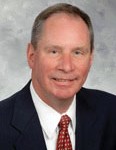 The Operational Integrity group – consisting of the Offshore Division, Onshore Division, Drilling & Well Services Division, and Accreditation & Certification Department – have been busy throughout the year promoting the interests of IADC members through various regulatory activities and major initiatives like our KSA project.
The Operational Integrity group – consisting of the Offshore Division, Onshore Division, Drilling & Well Services Division, and Accreditation & Certification Department – have been busy throughout the year promoting the interests of IADC members through various regulatory activities and major initiatives like our KSA project.
In addition, this year marked the opening of our new Crown Center, a multipurpose, versatile meeting facility that was designed to provide a home within IADC’s Houston office for the association’s committees, task forces and other workgroups engaged in activities important to our members. We’re also in the midst of a comprehensive review of all of our committees and their structure to ensure they are focused on critical issues and aligned with our members’ needs.
A side of IADC not often seen by our members is the bulk of our behind-the-scenes work with other industry groups and collective regulatory bodies.
Throughout the year, IADC has been actively engaged with the Wells Expert Committee of the International Association of Oil & Gas Producers (OGP). Within the WEC, we are active on both the Human Factors, Training & Competency Task Force and the BOP Technology Task Force.
The former will soon release its first document, a report on recommendations on technical enhancements to well control training, examination and certification. Even before its publication, a number of the recommendations in this report were already being considered as enhancements to our well control efforts by the WellCAP Advisory Panel.
In the BOP Task Force, IADC has been working with OGP to respond to a request posed by the International Regulators Forum to evaluate the reliability and functionality of subsea systems. That effort has culminated in a study now under way, as both groups reported to a meeting of the IRF in September in Brazil. As also reported to the IRF, IADC is taking a step toward rig crew competency with our KSA project, in addition to ongoing maintenance of our HSE Case Guidelines and a proposed new bridging document, which will function as a companion to the guidelines.
In the year ahead, we’ll be adding more capability to the group. We recently hired Scott Maddox as director of drilling and well services, who will be responsible for overseeing the Underbalanced Operations & Managed Pressure Drilling Committee, Advanced Rig Technology Committee and Well Servicing Committee.
We are also in the process of bolstering the Onshore Division with the addition of land rig operations specialist, and we’ll be taking our popular Land Operations Forums “on the road” in an effort to involve more members on a regional and local basis.
Alan Spackman, vice president – offshore technical and regulatory affairs
John Pertgen, Director – Offshore Regulatory and Technical Affairs
At its September 2011 meeting, the IADC HSE Case Users Group adopted amendments to the MODU HSE Case Guidelines to address gaps identified through a gap analysis against the provisions of API RP 75 and the SEMS rule of the US Bureau of Safety and Environmental Enforcement (BSEE). The changes addressed temporary refuge and escape routes, drawings and schematics, design and commissioning of new facilities, management of change, job safety analyses and record retention.
The September 2012 meeting of the Users Group concluded that no additional amendments to the guidelines would be made at this time but noted that results of various regulatory initiatives that are being considered will need to be reflected in the guidelines’ legislative annexes, if not in the guidelines themselves. These initiatives include those of the European Commission, Australia, New Zealand and the US. The 2012 meeting was also asked to give preliminary consideration to the development of globally applicable guidelines on bridging arrangements, modeled on the proposed API/IADC Bulletin 97, Well Construction Interface Document.
 Industry suggests revisions for BSEE’s SEMS 2 regulations
Industry suggests revisions for BSEE’s SEMS 2 regulations
IADC and other industry groups provided detailed comments to BSEE in response to their proposal for a revision of their recently issued safety management systems regulations (SEMS 2). Among the suggestions offered by the joint industry group were :
• Wording related to BSEE jurisdiction “creates considerable and unacceptable ambiguity,” exacerbated by the inclusion of well intervention activities in the proposed definition of MODUs.
• To avoid confusion, the definition of MODUs should be consistent with the published definition in the MOU and API RP75.
• The proposed rule contains conflicting statements as to whether the operator or contractor is responsible for training contractor employees.
• The availability of independent third-party auditors (I3Ps) was not assessed in relation to the proposed requirement for the use of I3Ps. The criteria to allow an established internal work force to continue to conduct audits should be reconsidered and defined, and a realistic timeline for implementing such a requirement is needed.
• The effective date for requiring employee participation was not specified.
• Revisions to the wording of the requirement for reporting of unsafe work conditions were suggested corresponding to a similar existing requirement.
Industry also noted that many in the industry have already voluntarily embraced API RP75 and implemented and evolved their SEMS prior to SEMS rulemaking. It’s also unclear how the agency will assess the effectiveness of an operator’s SEMS and delineate the purpose of SEMS audits of critical processes from typical agency compliance inspections.
In separate comments, IADC identified shortcomings in the proposed regulations, particularly with regard to the ambiguity in their application to combined operations and in how they proposed to place “ultimate work authority.”
Safety management systems for arctic operations
Supporting IADC’s Government Affairs efforts, Mr Spackman represented IADC in a June workshop in Keflavik, Iceland, on Protection of the Arctic Marine Environment that focused on safety management systems and their role in the prevention of marine pollution, with particular reference to arctic operations. This was followed by a September workshop in Halifax, Nova Scotia, where a group of invited experts from various industries, regulators, government bodies and academia on safety culture, oil and gas operations, and Macondo investigations and their findings and recommendations were asked to examine the role that safety culture played in the accident. IADC was represented by Julia Swindle, industry compliance specialist, at that workshop.
Caribbean-region spill issues examined
In December 2011, the IMO/UNEP Regional Activity Center for the Wider Caribbean held a seminar in Nassau, the Bahamas, to discuss regional needs related to potential spills associated with offshore oil and gas development in the wider Caribbean region and to lay the groundwork for future regional assistance and cooperation. The seminar included discussions of national oil and gas development projects and national capabilities, regulatory programs to prevent and respond to uncontrolled flow from a well, and national and regional capabilities to do so.
Countries sending delegates to the seminar were the Bahamas, Cuba, Jamaica, Mexico and the US. Mr Spackman participated as a member of the US delegation, along with representatives of the US Department of State, EPA, NOAA, Coast Guard and BSEE.
Follow-up workshops have been held in Curacao, Jamaica and Mexico to facilitate information sharing and strengthen regional cooperation on oil spill prevention and response planning focusing on offshore oil and gas exploration and production activities.
IMO Maritime Safety Committee actions to affect contractors
Mr Spackman recently represented the association at the 90th session the IMO Maritime Safety Committee (MSC), where several actions were approved that will affect offshore drilling contractors.
• Accepting a proposal by the Bahamas, the MSC has directed its Sub-Committee on Dangerous Goods, Solid Cargoes and Containers to develop amendments to the IMO MODU Codes to ensure that the provisions of the recently approved SOLAS regulations requiring periodic confined space rescue drills are extended to MODUs. Regulatory text to be considered at the Committee’s December 2012 session will amend all three editions of the MODU Code to require such drills to be performed every two months.
• Accepting a proposal by Liberia, the Marshall Islands, Vanuatu, IADC and the International Marine Contractors Association (IMCA), the MSC has directed the Sub-Committee on Standards of Training and Watchkeeping (STW) to revise Resolution A.891(21) on recommendations on training of personnel on mobile offshore units. IADC is preparing a comprehensive proposal that will be submitted to STW for consideration at its April 2013 session.
• Accepting a proposal by the US, IADC and IMCA, the MSC also directed the Sub-Committee on Ship Design and Equipment to develop amendments to MSC/Circ.645 on guidelines for vessels with dynamic positioning systems.
• In approving new SOLAS regulations aimed at prohibiting chemical processing onboard ships at sea, the committee also accepted amendments to the proposed regulation that were proposed by Liberia, the US, Vanuatu, IADC, IMCA and the Oil Companies International Marine Forum that exempted offshore oil industry vessels from the SOLAS amendments. Had the exemption not been included, the SOLAS regulations could have been interpreted to prohibit onboard mixing of downhole fluids and cements.
Other IMO activities of concern
Tier III engine emission standards. Regulation 13.10 of MARPOL Annex VI calls for a review of the status of technological developments to implement the Tier III NOx emissions standards to be completed at the May 2013 session of the Marine Environment Protection Committee in order to determine their availability for implementation in 2016. Two technologies have been put forward as being available to allow the IMO to implement the standards: selective catalytic reduction (SCR) and exhaust gas recirculation (EGR) technologies. IADC remains concerned that, while these technologies may be available, they may not be appropriate for the particular operational conditions of MODUs, particularly the engine load profiles for drilling operations and the operating areas where the availability of redactant for SCRs may not be available.
The International Convention for the Control and Management of Ships Ballast Water & Sediments is close to meeting the requirements for its entry into force. The terms of the convention attempted to force the development of the technology for treatment of ballast water, and a number of technologies have been developed, and systems using these technologies approved, to meet the convention’s requirements. Unfortunately, technological developments have not addressed the needs of certain vessel types, including those which must rapidly take on large volumes of ballast water for stability purposes such as semisubmersible drilling units and heavy-lift transport vessels. IADC continues to work to ensure that the needs of such vessels are recognized by the IMO and agreement reached on alternative measures that will allow these vessels to meet the requirements of the convention when it enters into force.
IMO has determined that it is appropriate to amend the SOLAS Convention to specify standards for onboard lifting appliances and winches. IADC has identified nearly 100 different classes of equipment that could be subjected to such standards, many of which are unique to drilling operations. IADC will be working to ensure that there is clear justification provided for the classes of equipment to be subjected to regulation, that there is clear identification of the equipment to be regulated and that the standards specified are appropriate.
IMO is developing requirements for periodic servicing and maintenance of lifeboats and rescue boats, launching appliances and release gear. Early drafts of these standards have limited the activities that can be carried out by shipboard personnel and required that other activities only be carried out by servicing facilities specifically qualified by the original equipment manufacturer. IADC is continuing to attempt to influence the final standards to avoid unwarranted burdens on rig owners.
IMO says no to oil spill liability regime for offshore oil and gas activities
At its 99th session on 16-20 April, the IMO’s Legal Committee considered a proposed change to the organization’s strategic direction to “focus on reducing and eliminating any adverse impact by shipping or by offshore oil exploration and exploitation activities on the environment.” This would be achieved by developing measures for mitigating the environmental impact of shipping incidents and operational pollution from ships, as well as liability and compensation issues related to transboundary pollution damage resulting from offshore oil exploration and exploitation.
The proposal resulted from an Indonesian-sponsored initiative proposing the establishment of an international liability and compensation regime for offshore oil and gas exploration and exploitation in the wake of the Montara incident. An amendment to the Strategic Directive was deemed necessary for the IMO to address the issue.
The text of a proposed amendment had been submitted to the IMO Council in 2011 but was returned to the Legal Committee for further consideration.
The debate was largely focused on two opposing positions: that of Indonesia, supporting the amendment, and one put forward by Brazil asserting that the IMO does not have a legal basis (within the UN Convention on the Law of the Sea or the International Maritime Organization Convention) for expanding its remit to address offshore oil and gas exploration and exploitation activities.
During the debate, which focused primarily on the proposed liability and compensation regime, numerous countries made oral interventions. As to be expected, most were somewhat circumspect and did not take a hard position.
IADC, represented by Mr Spackman, expressed the view that the proposal to revise the strategic direction could take the organization into a wholly new field of activities, including areas of design, construction and operation of offshore drilling units and support services, which would be well outside the scope of liability and compensation for transboundary pollution damage. If this is intended, then it should be made clear.
The committee agreed to inform the council that it wished to analyze further the liability and compensation issues connected with transboundary pollution damage resulting from offshore oil exploration and exploitation activities, with the aim of developing guidance to assist states interested in pursuing bilateral or regional arrangements without revising the strategic direction. The committee recognized that bilateral and regional arrangements were the most appropriate way to address this matter and that there was no compelling need to develop an international convention on this subject. Indonesia made it clear that it would continue to pursue this issue.
API to stop sending standards through ISO process
In the early 1990s, API and many of its members adopted the mantra of “Do it once, do it right, do it globally,” with the goal of transitioning API’s upstream oil and gas industry standards to international standards developed under the auspices of the ISO Technical Committee on Materials, Equipment and Offshore Structures for Petroleum, Petrochemical and Natural Gas Industries (TC 67).
This aspirational effort has come to a standstill, with API announcing that it will no longer send its standards through the ISO process. API’s decision reportedly stems from an inability to reach agreement with ISO regarding intellectual property rights, as well as concerns relating to US sanctions against Iran and Iranian participation in the ISO process.
“How this will affect the continued development of ISO standards remains to be seen, as many companies, both in the US and Europe, are taking a cautious approach toward participation in the ISO process due to the sanctions concerns,” Mr Spackman reported. “Further, the ISO standards development process has benefitted greatly from, if not relied upon, having API standards presented as core documents for further development into ISO standards, along with the direct participation of the industry experts that developed the API standards.”
API and OGP are participating with other stakeholders in developing a long-term plan for global standards development and it remains stated API’s objective to work towards one global standard.
“How the global standards development process will evolve in response to these challenges is not clear. Ultimately, it will be determined by the support of oil and gas exploration and production companies, service providers and equipment suppliers as they decide where their standards-development resources can best be applied,” Mr Spackman said. Nonetheless, many ISO standards activities continue.
ISO to develop site-specific assessment of floating units
ISO’s Offshore Structures Subcommittee (TC 67/SC 7) has approved a proposal for the development of a new standard ISO 19905-3, site-specific assessment of mobile offshore units – part 3: floating units. Experts were nominated by France, the US, the UK, Singapore, Canada, the Netherlands and Norway to develop the standard, which is targeted for publication in 2014. SC 7 also approved projects to update the standards for seismic design procedures (ISO 19901-2), geotechnical and foundation design (19901-4), and to develop a new standard on marine soil investigation (19901-8).
ISO subcommittee on arctic operations to be established
ISO’s Technical Committee 67 on materials, equipment and offshore structures for petroleum, petrochemical and natural gas industries has decided to establish a new subcommittee (SC 8) on arctic operations. Mikhail Rusakov, head of Gazprom’s offshore projects directorate, will chair the new ISO/TC 67/SC 8 Arctic Operations. The subcommittee will be responsible for the standardization of operations associated with exploration, production and processing of hydrocarbons in onshore and offshore arctic regions and other locations characterized by low ambient temperatures and the presence of ice, snow and/or permafrost.
The following ISO member bodies have expressed their intention to actively participate in the work of the subcommittee: Canada, France, the Netherlands, Norway, the Russian Federation and the US. IADC is requesting that it be granted liaison status with the new subcommittee. The first meeting is provisionally scheduled for April 2013 in Moscow. Companies interested in participating should contact their national standards organization.
Jackup site assessment standard published
After nearly two decades of effort, ISO 19905-1:2012 – Site-specific assessment of mobile offshore units – Part 1: Jackups has been finalized and is available from ISO, national standards bodies and various technical publications providers. The standard specifies requirements and guidance for the site-specific assessment of independent-leg jackup units. It addresses (1) manned non-evacuated, manned evacuated and unmanned jackups and (2) the installation phase at a specific site.
A related document, ISO/TR 19905-2 – Site-specific assessment of mobile offshore units – Part 2: Jackups commentary and detailed sample calculation, has passed ballot and should be available soon.
The IADC Jackup Rig Committee, which was formed to support the development of these ISO standards, will likely be continued to provide a forum in which technical issues associated with jackup site assessment can be discussed.
China to seek standard for offshore fixed platform modular drilling rigs
China has indicated that it will prepare a proposal for initiation of a new work effort at ISO for the development of a standard for fixed platform modular drilling rigs. China’s proposed work is based on existing Chinese standards. Based on the existing Chinese standards, ISO TC 67 has asked China to clarify how the standard or standards are to be organized and to address how any overlaps with the existing suite of ISO standards would be addressed. Singapore and Malaysia also expressed interest in this standard.
IADC comments on New Zealand HSE regulations revision
In August, IADC submitted comments to the New Zealand Department of Labour commenting on its review of the Health and Safety in Employment (Petroleum Exploration and Extraction) Regulations of 1999.
The letter, sent by Mr Spackman to the department’s Health and Safety Policy Unit, noted that IADC intends to assess its HSE Case Guidelines for MODUs against the revised New Zealand regulatory requirements when they are promulgated. The IADC guidelines will be revised as appropriate, with a new section to assist members in ensuring compliance.
Mr Spackman also emphasized that IADC and API are developing the Well Construction Interface Document to provide guidance on bridging the drilling contractor safety case to that of the operator. Although this targets operations in US jurisdiction, IADC is in the process of developing similar guidance for global applications.
IADC also provided detailed comments on specific sections of the New Zealand regulations revision relating to:
• Potential for major accident events;
• Duties to ensure the safety of wells, installations and activities carried out on installations;
• Promoting competence in persons carrying out well operations;
• Notification of well operations;
• Cooperation;
• Notification and reporting of dangerous occurrences;
• Workforce involvement in the preparation and revision of safety cases;
• Appropriate resourcing for safety case assessment;
• Revision of safety cases;
• Particulars to be included in safety case for installation; and
• Standards to be applied to petroleum operations.
OESC submits recommendations to DOI/BSEE
The Ocean Energy Safety Advisory Committee (OESC) has submitted its first formal recommendations to the US Department of the Interior (DOI) and BSEE. These recommendations included:
• Safety management system enhancement – Continued work on BSEE’s SEMS 2 rule should be focused on addressing four critical issues with the current SEMS regulations – jurisdiction, responsible party, performance-based approach and process safety management.
• Safety culture – DOI/BSEE should establish an Offshore Leadership Safety Council, including key representatives from regulatory bodies, industry and stakeholder organizations. The council’s role would be to:
– -Develop, communicate and foster a safety culture for the industry that provides a common value;
– Formulate a safety culture recognition program to motivate organizations;
– Encourage and incentivize engineering schools to include elements of safety engineering programs; and
– -Encourage industry to develop a structure for conducting consistently detailed accident and near-accident investigations and reporting them to the industry and regulators.
• Leadership and communication training – BSEE/DOI should work with the industry and the new council to develop leadership and communication safety training requirements.
• Workshop on organizational and systems readiness for containment response – A workshop should be developed to debrief government, industry and academic resources involved in Macondo to discuss lessons learned.
• Assessment and development of research priorities for containment of a non-capable blowout – DOI/BSEE should immediately begin synthesis of Macondo reports on organizational and system readiness pertaining to source control.
Don Jacobsen, Noble Drilling, is a member of the OESC.
IADC, BROA detail MLC 2006 implementation issues
IADC and the British Rig Owners Association (BROA) jointly responded to the UK’s Maritime and Coastguard Agency regarding the UK’s implementation of the Maritime Labour Convention, 2006 (MLC). IADC and BROA, the trade association for British owned and managed rigs operating on the UK continental shelf, wrote in support of prior comments submitted by the UK Chamber of Shipping and addressed potential impacts of MLC ratification and implementation within the UK. The joint letter included annexes that addressed:
• Crew accommodation regulations: Multiple occupancy cabins for crews are normal practice and are necessitated by the density of equipment and size of the work force. To change this in favor of single-occupancy cabins on new platforms is not feasible in all cases and may be prohibitively expensive. Also, specifications of ventilation system performance are beyond the scope of the MLC itself, and the excessive requirements should be removed.
• Food and catering regulations: Better guidance is needed on the use of chlorine and chloramine in water treatment. Further, the requirement for fresh water tanks to be emptied, inspected, cleaned and overhauled on a 12-month basis is considered excessive given the longevity of modern systems.
• Medical care regulations: The requirement to carry a doctor if more than 36 hrs of sailing time from a suitable port is not suited to MODUs, which are covered by other means of assistance and personnel transfer, such as helicopter services and standby vessels. Additionally, the liability of the shipowner for expenses related to a seafarer’s illness or injury should be constrained to that imposed by the MLC. The proposed wording of “any expense reasonably incurred” is too wide and will lead to inconsistent application.
• Shipowner liability – The MLC is specific about which shipowner is required to provide financial security, and the UK’s implementation should mirror that clarity.
• Other comments on MLC and MODU operations – International understanding of whether the flag or coastal State will have responsibility for: identification of competent authorities, enforcement responsibilities, employment agreements, control over wages and calculation of wages for work exceeding eight hours per day, hours of work and rest regulations, inspections and consultation. Also, obligations for repatriation to the country of residence should not be placed upon the shipowner for foreign nationals who have obtained authority to work in the coastal State, were hired in the coastal State and are governed by a labor agreement in the coastal State. It must be clear whether the coastal State will be willing/obligated to accept the manning levels established by the flag state.
IADC and BROA’s concerns, among others within those categories, are derived from the fact that MODUs are subject not only to their flag State’s maritime regulations and maritime enforcement but also to the laws of the nation on the continental shelf of which they operate. These regulations, in combination with the MLC, can create conflict between requirements of local land-based regulators and those of the MLC/flag State.
The IADC/BROA letter has also been forwarded to other national regulatory agencies that are beginning to develop their plans for implementing MLC in an effort to influence their development efforts.
Maritime Labour Convention to enter into force in August 2013
The International Labour Organization has announced that the Maritime Labour Convention 2006 has met the criteria for entry into force. On 20 August, it received its 30th ratification and, since the tonnage threshold had already been met, it will enter into force on 20 August 2013.
Intended as a “flag-State” instrument, it is IADC’s view that MLC is particularly ill-suited for application to MODUs, where the coastal States in which these units operate commonly extend their social and labor requirements to MODUs operating in areas under their jurisdiction and where large numbers of third-party personnel (who may be considered “seafarers” under the Convention) may be employed on board.
Working with members, IADC is pleased that many flag-States have determined that MODUs are excluded from MLC. IADC will continue to work with other flag-States and coastal-States to assure that the status of MODUs under MLC is clearly understood and appropriately reflected in national regulations.
Joe Hurt, regional vice president –North America and lead staff land HSE issues
Paul Breaux, Assistant Director – Land Operations and lead staff person on the Rig Moving Committee
An Administrative Law judge with the US Occupational Safety and Health Review Commission (OSHRC) struck down OSHA’s fire-resistant clothing (FRC) memorandum. The March 2010 enforcement directive to OSHA regional administrators and state plan designees purported to clarify OSHA policy for citing the general industry standard for personal protective equipment (PPE) for failure to provide and use FRC in oil and gas drilling and servicing operations.
The court found that the FRC memo constituted improper rulemaking. By using the terms “concludes” and “requires,” OSHA went beyond interpretation into the realm of rulemaking by converting a performance-based standard into a specific standard. Further, the court found that the memo does not have the force and effect of law. If OSHA wishes to require FRCs, the agency must resort to the required notice and comment rulemaking process. This is the position that IADC took in its letter to OSHA in April 2010 asking the agency to rescind the memo.
In November 2011, Mr Hurt and Kristin Hincke of the Association of Energy Service Companies (AESC) visited representatives of US House and Senate members regarding OSHA’s use of memos and interpretations to change or make regulations. Meeting with staff representatives of senators and congressmen, Mr Hurt highlighted the process OSHA used in changing the personal protective equipment rule (29 CFR 1910 132), particularly in regards to issuing its FRC letter of instruction to area directors. Other OSHA, EPA and DOT issues, where proper procedures were not followed, were discussed.
The visits were part of a joint effort with the AESC. All congressional staff representatives agreed with the IADC and AESC position and expressed support for sending a letter to OSHA requesting that the agency not attempt to change regulations through interpretations and directives. Texas Congressman John Culbertson, Kansas Congresswoman Lynn Jenkins and Louisiana Sen. Mary Landrieu have previously sent letters to OSHA expressing their concern with the process OSHA followed in regard to PPE regulations, specifically with FRC.
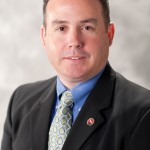 Federal Motor Carrier Safety Administration publishes final rule on cell phone use
Federal Motor Carrier Safety Administration publishes final rule on cell phone use
The Federal Motor Carrier Safety Administration and the Pipeline and Hazardous Materials Safety Administration published a final rule in December 2011 to prohibit use of handheld mobile phones by commercial drivers while driving or on the road.
Under the final rule, driving refers to operating a motor vehicle on the road, including those that are temporarily stationary because of traffic, a traffic control device or other momentary delays. It does not include operating a commercial motor vehicle when the driver has moved the vehicle to the side of or off a highway and has halted in a location where the vehicle can safely remain stationary. The final rule does not ban the use of hands-free devices.
Drivers who violate the restriction can be charged a civil penalty of up to $2,750; a civil penalty of up to $11,000 can be imposed on employers who fail to require their drivers to comply. Additionally, motor carriers are prohibited from requiring or allowing drivers of CMVs to use handheld mobile telephones.
The agencies also amended regulations to implement new driver disqualification sanctions for CMV drivers who fail to comply with this federal restriction. Further, new driver disqualification sanctions restricting the use of handheld phones were implemented, applying to those who hold a commercial driver’s license and have multiple convictions for violating a state or local law or ordinance on motor vehicle traffic control.
NHTSA issues notice on voluntary driver distraction guidelines
The National Highway Traffic Safety Administration (NHTSA) issued a notice in 2012 on nonbinding, voluntary NHTSA Driver Distraction Guidelines. The notice details contents of the first phase of the guidelines, which covers original equipment in-vehicle device secondary tasks performed by the driver through visual-manual means. Such activities include communications, entertainment, information gathering and navigation tasks not required to drive.
The proposed guidelines list certain secondary, non-driving related tasks believed to interfere inherently with a driver’s ability to safely control the vehicle. Those in-vehicle devices are recommended to be designed so that they cannot be used by the driver while driving.
For all other secondary, non-driving-related visual-manual tasks, the guidelines specify a test method for measuring the impact of task performance on driving safety and time-based acceptance criteria for assessing whether a task interferes with driver attention too much. If a task does not meet the acceptance criteria, the guidelines recommend that in-vehicle devices be designed so that the task cannot be performed by the driver while driving.
OSHA HCS harmonized with UN standards
In March 2012, OSHA issued a final rule aligning its Hazard Communication Standard (HCS) with the United Nations’ Globally Harmonized Systems of Classification and Labeling of Chemicals.
HCS requires chemical manufacturers and importers to evaluate the hazards of the chemicals they produce or import, as well as prepare labels and material safety data sheets to convey the hazards and associated protective measures to users of the chemicals.
The modifications include:
• Revised criteria for classification of chemical hazards;
• Revised labeling provisions, including requirements for the use of standardized signal words, pictograms, hazard statements and precautionary statements;
• A specified format for safety data sheets, revisions to definitions of terms used in the standard; and
• Requirements for employee training on labels and safety data sheets.
The rule became effective 25 May 2012.
Dunes sagebrush lizard protection status rejected
In June 2012, the US Fish and Wildlife Service made its final determination that the dunes sagebrush lizard does not warrant endangered status under the Endangered Species Act. IPAA president and CEO Barry Russell stated, “Sen. John Cornyn (R-TX), Sen. Jim Inhofe (R-OK), Rep. Steve Pearce (R-NM) and Rep. Mike Conaway (R-TX) have been instrumental in combating this listing, which would have been a death toll to jobs, energy and economic growth in these areas. After a year and a half of consideration, the Fish and Wildlife Service has made the right decision regarding the protection status of the dunes sagebrush lizard. The Interior Department’s decision affirms the fact that oil and natural gas development and environmental protection are not in opposition, as it recognizes the successful conservation efforts of regulators, nonprofit groups and industry working together at the state level.”
FMCSA seeks input on hours of service regulatory guidance
In the 5 June 2012 US Federal Register, the Federal Motor Carrier Safety Administration (FMCSA) announced its revision of regulatory guidance to clarify the applicability of the “oilfield operations” exceptions in 49 CFR 395.1(d) to the “Hours of Service of Drivers” regulations and requested comments on the revision. The regulatory guidance is being revised to ensure consistent understanding and application of the regulatory exceptions. To develop better understanding of the oilfield exception, FMCSA is seeking clarification on two questions:
• What does “servicing” of field operations of the natural gas and oil industry cover?
• What kinds of oilfield equipment may drivers operate while taking advantage of the special “waiting time” rule?
IADC solicited member input on how the rules would affect their operations and submitted comments to the docket.
OSHA seeks input on variance for ladders on rig derricks
In 1973, OSHA issued a temporary variance from 29 CFR 1910.27 for ladders on drilling rig derricks. The variance was obtained by IADC because although most parts of derrick ladders may meet the requirements of 1910.27, there are some ladders or parts of derrick ladders that do not. This temporary variance was issued to IADC and its listed members at the time.
OSHA recently realized that they had not followed up and made the variance permanent and is seeking input form IADC on the need for the variance. Although IADC will seek a permanent variance for the drilling industry, all drilling contractors who wish to be included in the variance will have to complete an application for their company.
IADC is working to collect member applications for submission to OSHA.
Oil and gas multi-agency stakeholder meeting hosted by OSHA
OSHA, along with other agencies with jurisdiction for oil and gas operations both onshore and offshore (EPA, BSEE, USCG, DOT, PHMSA, BLM and BOEM) held a two-day public stakeholder meeting on 20 and 21 September at the College of the Mainland in Texas City to explore the use of management systems in the US. The interagency group asked for input from industry on the potential success/problems with a performance-based regulatory program as opposed to current prescriptive regulations. OSHA asked for industry input on such a change in the regulatory regime of the agencies. OSHA also sought input from industry regarding merging regulations across agencies.
Other US land operations initiatives:
• Participated in the creation of the OSHA 5810 Hazard Recognition and Standards Course for the upstream oil and gas industry;
• Participated and supported the National STEPS Networks throughout the continental US;
• Participated in the Oklahoma Safety Standdown sponsored by OSHA and the National STEPS Network;
• Participated on the Respirable Silica Focus Group;
• Participated on NIOSH’s NORA Council;
• Participated and supported various safety summits throughout the continental US; and
• Facilitated the Swamper Competency Guidelines through the Rig Moving Committee.
Mark Denkowski, vice president – accreditation and certification
Dr Brenda Kelly, senior director – Program development
 The Accreditation and Certification Department (ACD) kicked off an ambitious project to develop worldwide competency guidelines for virtually all rig positions, with Phase One priority on safety-critical positions with well control responsibilities. The guidelines, to be built upon IADC’s Knowledge, Skills and Abilities (KSA) templates, aim to provide tools for confirming the proficiency levels of the drilling work force, developing competence levels for new entrants and helping ensure that a globally accepted level of competency exists in the drilling industry.
The Accreditation and Certification Department (ACD) kicked off an ambitious project to develop worldwide competency guidelines for virtually all rig positions, with Phase One priority on safety-critical positions with well control responsibilities. The guidelines, to be built upon IADC’s Knowledge, Skills and Abilities (KSA) templates, aim to provide tools for confirming the proficiency levels of the drilling work force, developing competence levels for new entrants and helping ensure that a globally accepted level of competency exists in the drilling industry.
“IADC is the global leader in developing competency and training programs for the drilling industry,” said 2012 IADC chairman Dan Rabun, chairman, president and CEO of Ensco. “This ambitious expansion of IADC’s KSAs represents a step-change for safety and competency in our industry.”
The project was launched with a workshop held at NASA’s Hi-Con Training Center in February 2012. More than 45 attendees representing 11 drilling contractor companies and nine operators convened to review the looming work force capabilities challenges facing the industry and discuss the vision for the KSA project. During two breakout sessions in which drilling contractors and operators met separately, Mr Denkowski and Dr Kelly facilitated discussions to gain better insight into member’s global needs for a common set of competence guidelines, and seek members’ guidance and direction for the project’s forward path. ACD staff also sought members’ commitment to ongoing participation in the project.
Both a steering committee and a review panel were established with representatives from IADC member companies. Further, Petrofac Training Services has been contracted to provide administrative and technical support of the project.
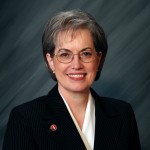 During the first of three planned phases for the project, IADC undertook a worldwide mapping of similar competency systems being used in other industries and even by governments to determine if there is an existing system structure that could be adapted for the drilling industry. Lessons learned from the organizations contributing to this effort helped assure that IADC’s competencies developed would be globally accepted. Approximately 10 to 15 positions are targeted in Phase One, including safety-critical positions with well control responsibilities such as driller, toolpusher and subsea engineer. This phase is expected to be complete by year-end or early 2013.
During the first of three planned phases for the project, IADC undertook a worldwide mapping of similar competency systems being used in other industries and even by governments to determine if there is an existing system structure that could be adapted for the drilling industry. Lessons learned from the organizations contributing to this effort helped assure that IADC’s competencies developed would be globally accepted. Approximately 10 to 15 positions are targeted in Phase One, including safety-critical positions with well control responsibilities such as driller, toolpusher and subsea engineer. This phase is expected to be complete by year-end or early 2013.
Phases Two and Three will target the remainder of rig-based positions, such as mechanic, electrician, roustabout, floorhand and derrickman.
Once released, the new guidelines will be open access, just like the original IADC KSA templates published in 2000. Those are still available online at the IADC website.
Well control training reviewed and strengthened
Strong emphasis on enhancing well control training has been a priority for ACD, with WellCAP accreditation requirements strengthened, curriculums revised or in revision, and an advisory panel formed.
WellCAP accreditation requirements changed
The amount of practical hands-on exercises and simulation for WellCAP courses was increased to at least 30% of the required course time, not including testing time. Prior to 2012, the activities could not exceed 30% of the course time. This change is expected to strengthen learners’ skills development and increase knowledge retention.
WellCAP program handbook revised
The WellCAP Handbook for Accreditation, Form WCT-01, was updated and revised, with all WellCAP accreditation criteria consolidated into one document. Other changes made to this version of the Handbook (Second Edition, Version 0) include:
• All program requirements previously published as bulletins, from Bulletin 04-02 to Bulletin 11-04, are now included in WCT-01.
• The WCT-01 document has been reorganized to more clearly delineate accreditation criteria, accreditation processes and accredited training providers’ responsibilities post-accreditation.
• Appendices have been added to list all WellCAP forms frequently used by accredited training providers and to provide an index of frequently asked questions, with referenced page numbers provided.
WellCAP curriculums revised
The supervisor-level WellCAP drilling curriculum was revised after months of intensive review, debate and discussion. The most notable changes were:
• Reorganization of the curriculum to focus on learning objectives;
• Addition of cased drilling and directional drilling topics;
• Removal of references to coiled tubing, wireline, snubbing and underbalanced operations as these operations are covered in separate curriculums; and
• Enhancement of the subsea module.
Equipment topics in the current curriculum were deemed adequate to meet industry’s basic needs. Course duration will not be impacted.
Other WellCAP courses under revision are the fundamental level drilling course and the underbalanced operations course (all levels). Both courses should be approved by end of year 2012. In addition, a subsea curriculum module is being developed for the WellCAP Workover/Completion course.
WellCAP advisory panel formed
The WellCAP Advisory Panel was officially formed in March 2012 to drive continuous improvement of the IADC WellCAP accreditation program. This panel will provide strategic direction and policy guidance to IADC staff administering the WellCAP program. Current areas of review include:
• Training structure;
• Training content;
• Testing;
• Accreditation;
• Governance; and
• Achievement.
Members will also provide guidance on frequency of training, continuing education opportunities, instructor qualifications, and other issues relevant to the WellCAP program.
The 16-member panel will consist of IADC drilling contractor and operator members, chairmen of the Well Control, Training, and Well Servicing committees, and an IADC staff representative.
OOC award
Dr Kelly received a Recognition Award from the Offshore Operators Committee (OOC) for her contributions to the development of the Safety and Environmental Management Systems (SEMS) Toolkit, a collection of tools to help the US oil and gas industry respond to the new SEMS regulations. She led the Competence Subcommittee in the development of the Compliance Readiness Worksheet and the Knowledge and Skills Documentation Tool. She contributed to other SEMS tools and spoke at a series of toolkit rollout conferences across the US.
OOC chairperson Susan Hathcock, Anadarko, presented the recognition awards to 10 industry leaders “in recognition of (their) efforts and contributions in the development and rollout of a SEMS Toolkit to address consistency and compliance with new BOEMRE requirements and your effective networking with other industry representatives.” Other award recipients were Julia Swindle, IADC industry compliance specialist ; Milton Bell, ExxonMobil; Bill Walker, Cobalt International Energy; Troy Nugent, Baker Hughes; Greg Duncan, ConocoPhillips; Jeff Ostmeyer, Anadarko; Roger Molaison, BHP Billiton; Kim Parker, Hercules Offshore; and Ruth Rodriguez, Delmar.
New staff
Two employees joined ACD in 2012. Brooke Comeaux joined ACD as competence and learning development specialist, and Alma Roberts serves as accreditation and certification coordinator for the HSE Rig Pass program.
Ms Comeaux’s responsibilities include curriculum development and program upgrades of IADC’s various accreditation programs, competence program coordination, and new technology integration. Ms Roberts is primarily responsible for managing the IADC HSE Rig Pass program.
Ken Fischer, vice president – international development
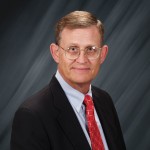 To expand the association’s global capabilities and increase support for regional chapters around the world, IADC has established an international development department dedicated to enhancing our worldwide service delivery. The association is aggressively working to establish new offices in key markets, adding to the existing network of representation in Europe, Middle East, Africa, Asia Pacific and Australia. Additional regional representatives will be brought onboard to help to identify member needs and facilitate provision of member services – a key delivery mechanism for IADC to enhance operational integrity as regional representatives will help to monitor, measure and improve performance by establishing a network of key member contacts with global operations responsibility.
To expand the association’s global capabilities and increase support for regional chapters around the world, IADC has established an international development department dedicated to enhancing our worldwide service delivery. The association is aggressively working to establish new offices in key markets, adding to the existing network of representation in Europe, Middle East, Africa, Asia Pacific and Australia. Additional regional representatives will be brought onboard to help to identify member needs and facilitate provision of member services – a key delivery mechanism for IADC to enhance operational integrity as regional representatives will help to monitor, measure and improve performance by establishing a network of key member contacts with global operations responsibility.
For instance, in Brazil, IADC is aware that members urgently require support and representation, as other Brazilian oil associations do not focus on issues directly affecting drilling contractors. IADC is keen to engage with relevant regulatory bodies and act as an intermediary with drilling contractors operating in the region.
A comprehensive review is ongoing of how IADC can better engage with its chapters to drive member alignment on critical issues.
The international development department also will continue to serve as an internal IADC “connector” to coordinate the needs of members in specific regions with the global capabilities within IADC, such as accreditation and certification needs, regulatory concerns, technical inquiries, contract issues, etc.
Jens Hoffmark, regional vice president – European operations
 EOF highlights offshore safety efforts
EOF highlights offshore safety efforts
Offshore safety was the focus of discussions at the IADC European Operations Forum (EOF) meeting on 12 June in Barcelona, Spain, with several regional regulators providing updates on post-Macondo efforts.
Steve Walker of the UK HSE discussed the way his organization managed the media, the public and the government following the April 2010 Macondo incident, as well as adjustments that have been made to UK’s existing HSE regulations.
Jan de Jong of the Dutch State Supervision of Mines offered his division’s reaction to Macondo, highlighting the need for enhanced process safety and more skilled employees.
From the Norway Petroleum Safety Authority (PSA), Øivind Tuntland provided updates on the PSA’s work since Macondo, and Taf Powell, European Commission adviser, discussed the newly established EU Offshore Authorities Group, noting that their objectives have been set out as being an EU-wide forum for regulators in an advisory role; identifying and exchanging best practices for major hazard prevention and emergency preparedness; disseminating lessons learned from accident investigations; and facilitating rapid information exchange between national authorities and the commission.
Steve Cromar, ConocoPhillips, gave an overview of ongoing work of the Wells Expert Committee, where four task forces are working on a database of well control incidents; BOP reliability and technology development; human factors; and international standards.
Finally, Dr Brenda Kelly, IADC senior director of accreditation and certification, provided an update on the KSA project and invited drilling contractors to actively participate.
IADC visits Poland, assesses emerging shale gas market
Mr Hoffmark visited oil companies, suppliers and regulators in Krakow and Warsaw, Poland, in 2012 to collect information on shale gas development in the country and promote awareness of the IADC Critical Issues for Shale Europe 2013 Conference & Exhibition, 23-24 October in Warsaw.
Poland currently imports 98% of its oil from Russia, and its natural gas production of 3.5 billion cu meters per year is not enough to meet the total demand of 14.5 billion cu meters. The country has been in search of alternatives, such as shale gas and renewable energy, in an effort to increase energy independence.
The Polish Ministry of Environment has granted 112 concessions so far to several international oil companies, with the most positive traces of shale gas being found close to the Baltic Sea in the northern part of Poland. It is reported that six companies out of 11 are considering further development based on exploration results thus far.
The US Geological Survey forecasted in 2009 that Poland could hold approximately 3 trillion to 5 trillion cu meters of shale gas. The estimate has since been revised to 38 billion cu meters, although no certainty can be established until additional drilling has been carried out. A minimum of 200 wells are required to produce a more precise reserves estimate, but only 28 wells have been drilled so far.
One challenge is that the Polish government is still lacking clear guidelines on taxation, HSE requirements and ownership rights to shale gas discoveries. To address this, the government is negotiating two bills on taxation and technical issues such as HSE. The Ministries of Finance, Environment, Economy and Treasury are working out relevant legislation, and it remains to be seen when the work will be completed. Until then, oil companies working in Poland are still left with uncertainty.
Oil and Gas Denmark launched
Mr Hoffmark attended the 23 August launch of Oil and Gas Denmark, an industry association that represents Danish drilling contractors, oil companies and service companies. The new group, headed by managing director Martin Næsby, has four focus areas: development of the oil and gas sector, infrastructure, HSE and development of competency.
In attendance at the launch event was Martin Lidegaard, Danish minister of energy. His inauguration speech emphasized the importance of the Danish oil and gas industry, which contributes about 9% of the total Danish export. Denmark has been self-sufficient in oil and gas since 1991 and has been a net exporter of energy. In the next five years, US $8 billion is expected to be invested in exploration and development.
Dave Geer, regional director – Middle East & Africa
More than 600 players participated in this year’s IADC Southern Arabian Peninsula Chapter (SAPC) Golf Tournament in Dubai, each playing two championship courses over the two-day competition.
The event was capped by an elaborate awards dinner followed by live entertainment. The evening event was attended by approximately 1,700 people.
Noble Corp hosts MEOF
Noble Drilling hosted an IADC Middle East Operations Forum (MEOF) meeting at the Emirates Golf Club in Dubai. Mr Geer conducted the meeting and reported on IADC events and activities with a focus on programs relevant to operations in the Middle East region. Mark Denkowski, IADC VP for accreditation and certification, provided a presentation to explain the programs that IADC is pursuing to assist members with training and competency. A key element of his presentation focused on IADC’s KSA program.
IADC Nigeria holds meeting
The IADC Nigeria Chapter, established in 2011, held a meeting in October 2012. The group, based in Lagos, is led by an Executive Committee consisting of Alex Illah from Transocean, Dr Olushola Ismail from Oando Energy Services, Ramoni Adeniji from Saipem Nigeria and Ben Agadaba of Lonestar Drilling.
Chit Hlaing, operations assistant– Asia operations
 AOF focuses on training, HSE questionnaires
AOF focuses on training, HSE questionnaires
IADC held its first Asia Operations Forum (AOF) meeting of 2012 on 24 April in Singapore to discuss regional training needs and other concerns for members in the Asia Pacific.
IADC VP of accreditation and certification Mark Denkowski kicked off the meeting with a presentation discussing the six IADC accreditation programs, as well as the accreditation process and new training-related projects that are under way.
That was followed by a roundtable discussion focusing on creating a comprehensive HSE questionnaire to be accepted as the standard safety questionnaire (SSQ) by operators in the Asia region and reviving the Southeast Asia Chapter and re-electing new officers.
On the first issue, it was agreed that a task group would be formed to develop a comprehensive HSE questionnaire template; it will be shared with operators for review and endorsement.
Members also expressed support for reviving the regional chapter. Upon identifying candidates to serve as officers, IADC will help coordinate a forum for an election and handover ceremony.
Another AOF was scheduled for 24 October in Singapore to discuss international standards activities affecting the offshore oil and gas industries and other critical issues for members in the Asia Pacific region.
A special guest presentation on QHSE management will be shared by RPS, and IADC will update members with the various conferences, activities and initiatives in the region and globally.
As with the customary AOF meetings, an open group discussion will be made on other key regional issues raised at the meeting, including the prospect of reviving the Southeast Asia Chapter. There is a necessity to appoint new officers to lead the chapter again in the region.
IADC attends PETRONAS launch of competence development program
PETRONAS Carigali’s Drilling Division launched its Capability Development Journey, an in-house structured competence development program, on 9 March in Kuala Lumpur. The approximately four-year program covers the fundamentals of exploration and production, petroleum engineering, drilling courses, WellCAP-accredited well control courses, and HSE-related courses, including offshore survival.
Offshore trips are incorporated into the curriculum for on-the-job training. Trainees’ time offshore is increased as they gain hands-on experience. Upon passing all courses, a final exam determines the type of job for which the engineer is most suited.
IADC attended the ceremony along with representatives from companies such as Baker Hughes, Halliburton, INSTEP, Schlumberger, Uzma and Weatherford. Datuk George Ling, adviser for the PETRONAS Drilling Division, provided the opening remarks, and Hj Zulkarnain Ismail, head of the division, recorded appreciation for the support of human resource management, technology and information management and technical capability management.
A handover ceremony was held between the Drilling Division and various companies, including reference materials such as IADC textbooks, the Schlumberger Field Data Handbook, Halliburton Red Book and Uzma Garraf Drilling Manuals.
PETRONAS will conduct its well control training through Transocean’s recently launched Kuala Lumpur facility. INSTEP, a PETRONAS subsidiary, will serve as training coordinator.
Indonesian local content workshop planned
IADC held a workshop for its drilling contractor members on “Prioritizing the Utilization of Domestic Goods and Services in the Upstream Oil & Gas Industry in Indonesia” based on Indonesia’s amended Procurement Working Procedure Manual PTK 007/Rev.2/I/2011.
IADC members, including Ensco, Nabors Drilling, Noble Drilling, Northern Offshore, Rowan Companies, Songa Offshore and Vantage Drilling, attended the one-day session on 25 October at the Hilton Hotel in Singapore.
PT Patra Mitra Konsulindo, an Indonesian consulting firm, helped conduct the training covering the legal aspects, basic principles and amendments made of local content calculation on procurement of materials, goods and services and how to properly prepare rig service cost structures and fill in local content in bid documents.
Jason McFarland, vice president – membership & marketing
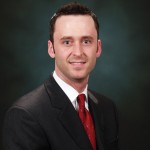 Business groups seek detailed FCPA guidance
Business groups seek detailed FCPA guidance
IADC wrote to the US Department of Justice (DOJ) and the Securities and Exchange Commission (SEC) to request that specific issues be addressed in detailed new guidance expected this year on the criminal and civil enforcement provisions of the Foreign Corrupt Practices Act (FCPA). The letter was signed by more than 30 business groups, including the National Association of Manufacturers, the National Foreign Trade Council and the US Chamber of Commerce.
A key issue is that, although the FCPA prohibits corrupt payments or offers of payments to foreign officials, there is not adequate guidance on who is a “foreign official.” A clear, uniform definition of “instrumentality” is needed so companies may conform their conduct. The letter also addressed a concern that sufficient consideration may not be given to potential defendant companies’ strong, pre-existing compliance programs when making enforcement decisions. Guidance is needed on what would be considered an effective FCPA compliance program that would merit favorable consideration in enforcement decisions.
Further, the FCPA does not set forth circumstances when a parent company may be held liable for a foreign subsidiary’s violations. This lack of statutory clarity is compounded by an apparent difference in enforcement policy between the DOJ and SEC, the groups noted. The letter detailed concerns with several additional key issues, including successor liability, gifts and hospitality, corporate criminal liability and other recurring issues.
IADC meets with DOJ, SEC
Noble Drilling Services’ James Sanislow, chairman of the IADC Ethics Committee, participated on behalf of IADC in a roundtable discussion on the FCPA with the US DOJ and the SEC. The event took place 11 April in Washington, DC, hosted by the US Chamber of Commerce Institute for Legal Reform.
Assistant Attorney General Lanny Breuer, SEC enforcement director Robert Khuzami and Commerce Department general counsel Cameron Kerry joined IADC and leading business community representatives for a discussion of the forthcoming guidance on FCPA enforcement.
At the forefront was the uncertainty that many US businesses face with the FCPA. Participants provided background on complexities in compliance and risk management arising from issues such as a lack of clarity around the definition of a “foreign official” and successor liability.
Mr Breuer and Mr Khuzami expressed appreciation for industry input in helping shape what they hope will be effective guidance. They also indicated that the agencies could release guidelines by late spring.
The IADC Ethics Committee is set to have its final meeting of 2012 on 12 December at IADC’s Houston office.
